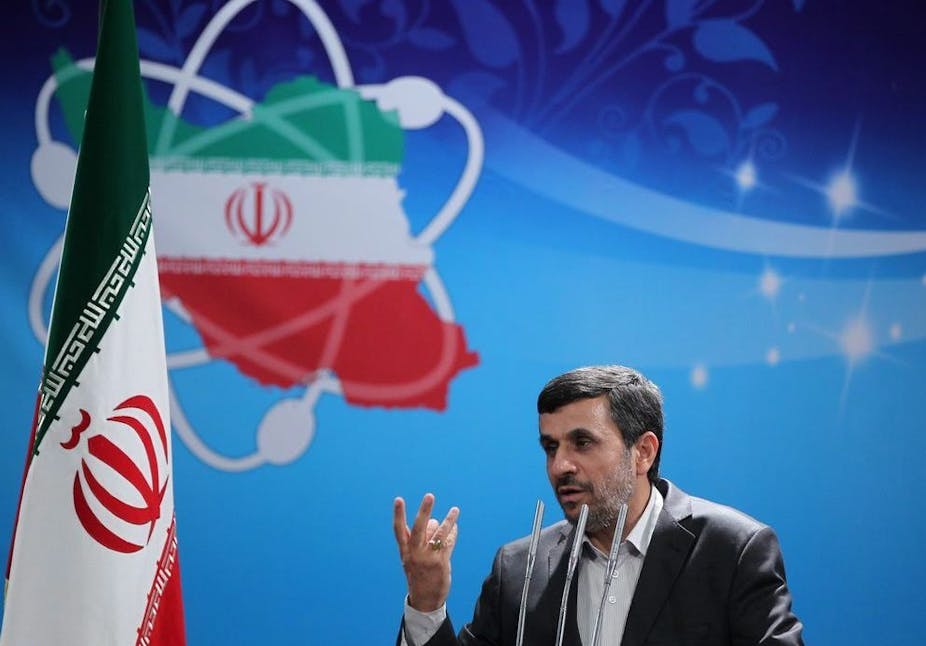Talk of a possible Israeli strike on Iran’s nuclear facilities has re-ignited debate over the right of self-defence under international law.
Some academics, including Anthony D'Amato and [Alan Dershowitz](link text here](http://www.huffingtonpost.com/alan-dershowitz/israel-has-the-right-to-a_b_836764.html), have claimed that an attack on Iran would be a permissible act of self-defence. Others, such as Kevin Jon Heller, argue that such action would be a clear breach of international law.
So, who is correct? Would military action against Iran be legal or illegal?
Under international law there are only two grounds on which an attack against Iran could be legally justified. The first is if the United Nations Security Council were to authorise collective military action under article 42 of the UN Charter. This is highly unlikely given long-standing divisions between Security Council members over how to deal with Iran.
The second, more controversial basis is self-defence. A country’s right to defend itself against an actual armed attack is explicitly provided for by article 51 of the Charter and also exists in customary international law.
But the more difficult issue - which arises in the Iran situation - is whether unilateral military action can be taken before an armed attack occurs. In other words, can a country use force to defend itself against a threatened attack?

Common sense suggests the answer should be yes. A country should not be forced to absorb the first blow before being permitted to defend itself. However, there is also a need to guard against the potential for such a right to be abused. An open-ended licence to use force against any perceived threat could give rise to aggression under the guise of self-defence.
Anticipatory self-defence against imminent attack
To balance these competing needs international law recognises a right of anticipatory self-defence against the threat of imminent attack. This has its origins in the famous 1837 Caroline incident, where Britain and the United States agreed that self-defence could be exercised only if there was “instant, overwhelming” necessity, “leaving no moment of deliberation”. Although anticipatory self-defence is not accepted by all countries today, recent UN reports have recognised that contemporary international law permits such action.
So, is there a threat of imminent attack from Iran that would permit anticipatory self-defence? The short answer is no.
Given its nuclear ambitions and inflammatory rhetoric against Israel, Iran may well pose a threat. But no country - not even Israel or the United States - has claimed that an attack by Iran is imminent. Therefore, as things currently stand, a right to use unilateral force in anticipatory self-defence is not available.
Preemptive self-defence against remote threats
Supporters of a strike against Iran argue that action is needed to prevent Tehran from acquiring nuclear weapons capabilities which might be used at some point in the future. This echoes claims of a right of preemptive self-defence made by the Bush administration in its 2002 National Security Strategy.
However, the so-called Bush Doctrine’s attempt to “adapt the concept of imminent threat to the capabilities and objectives of today’s adversaries” received virtually no support from other countries. As a result, the US and its allies decided not to use preemptive self-defence as their main legal justification for the 2003 Iraq war.

Israel has twice taken preemptive action in the past. Its destruction of Iraq’s Osirak reactor in 1981 was roundly condemned by other countries, including the United States.
More recently, a 2007 Israeli air-strike on a secret Syrian nuclear facility attracted surprisingly little international criticism. However, this was a covert operation for which Israel has never officially admitted responsibility. Therefore, it cannot be considered a precedent for the legality of preemptive self-defence.
From a political perspective, preemptive strikes against nuclear facilities might attract less criticism today than in the past. But the notion of preemptive self-defence against remote threats has no basis in current international law.
Unpersuasive arguments by D'Amato and Dershowitz
D'Amato and Dershowitz try to side-step the issue of preemptive self-defence by shifting the focus from the threat of future attack to past and present Iranian conduct. D'Amato claims that because Iran’s verbal threats against Israel are a breach of article 2 of the Charter - which prohibits the “threat or use of force” - an attack on Iran would not violate international law. He argues that by “taking the initiative to block” Iran’s nuclear ambitions, Israel or the US would “be preserving international law for future generations”.
However, D'Amato is on shaky legal ground here. Individual countries do not have a right to use force on behalf of the international community, unless that action is authorised by the Security Council. Verbal threats may well be a violation of article 2(4) but they do not trigger the right of self-defence. Instead, article 51 requires an actual or imminent armed attack as a prerequisite to self-defence.
Dershowitz’s argument goes a step further than D'Amato’s. He claims that Iran has already committed an armed attack against Israel through violence carried out by Hezbollah and Hamas, militant groups which Tehran supports. Thus, for Dershowitz, Israeli military action against Iran should be considered an exercise of “reactive” self-defence, rather than a preemptive strike.
As Heller points out, there are two problems here. First, it is unlikely that Iranian links to Hezbollah and Hamas are sufficiently close to satisfy the legal standard of “effective control”. Therefore, Iran would not be deemed legally responsible for an armed attack carried out by one of those groups.
The second problem is that an Israeli military strike against Iran’s nuclear facilities could hardly be considered a necessary and proportional response to an attack emanating from a different source - Hezbollah or Hamas - at a different geographical location. Dershowitz’s attempt to link two distinct security issues is, therefore, unpersuasive.
The Iranian nuclear issue is a serious concern for the international community. From a political perspective there may now be greater tolerance of preemptive action. But from an international law standpoint, a unilateral military strike against Iran would be illegal.

